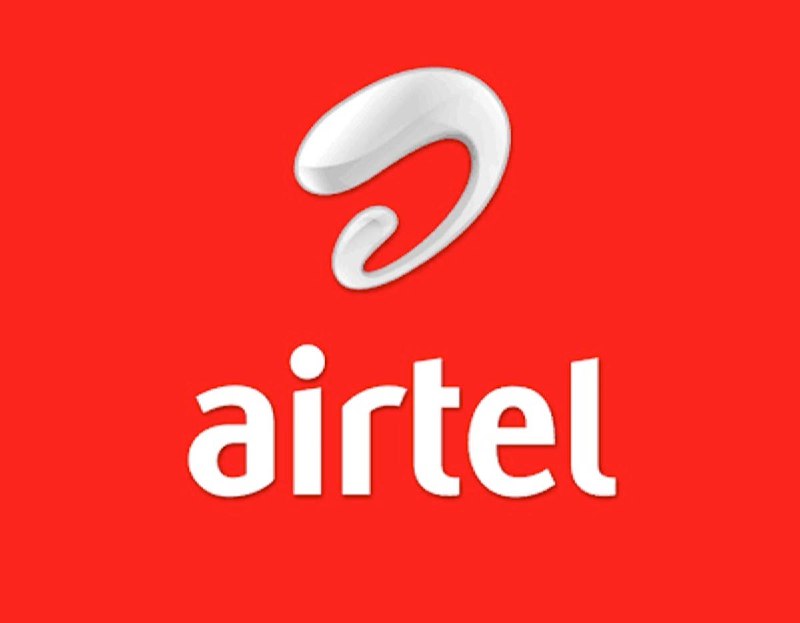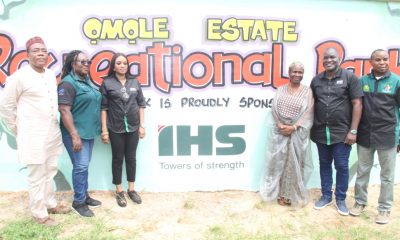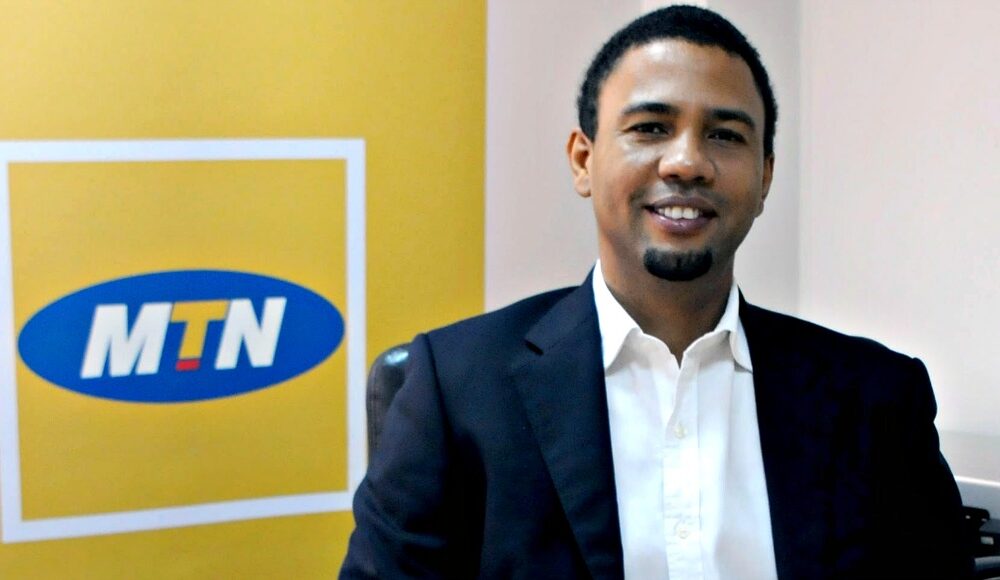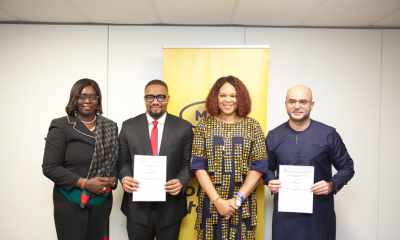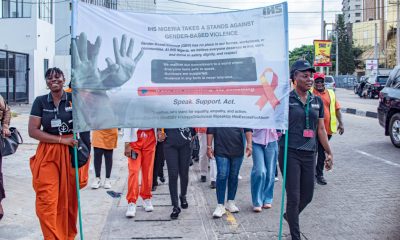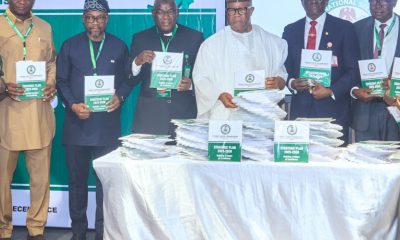Technology
NCC Demands Financial Statements of MTN, Airtel, Others
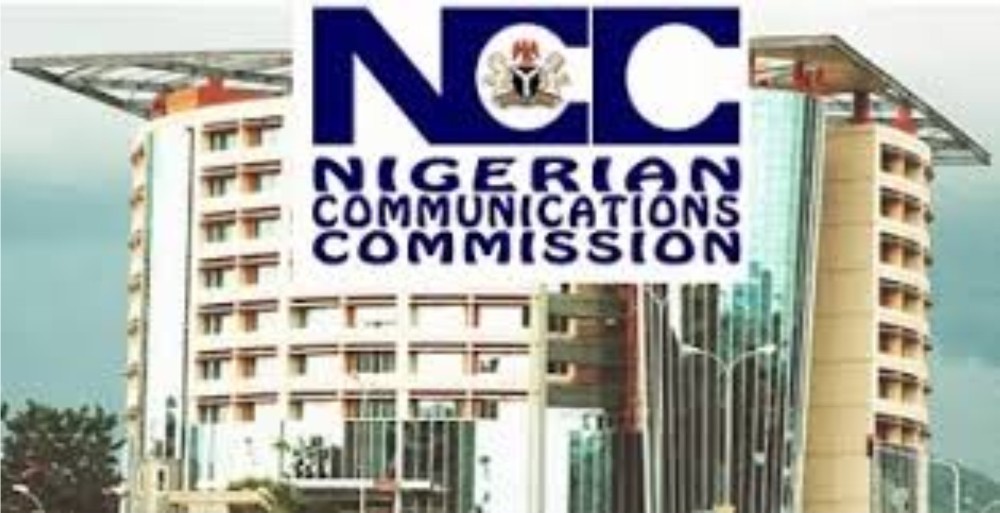
By Adedapo Adesanya
The Nigerian Communications Commission (NCC) has directed licensed telecommunications service providers including MTN Nigeria, Airtel Nigeria, Globacom and three others to submit their financial statements as part of its ongoing Account Separation Framework (ASF).
This was disclosed in a statement issued by the NCC Public Affairs Director, Mr Ikechukwu Adinde, who explained that the request was to speed up the exercise which kicked off last week.
The six telcos that the directive cover include – Airtel Nigeria, MTN Nigeria, 9Mobile, Globacom Nigeria, Main One Cable Company Limited and IHS Nigeria.
According to the statement, the submission will help the commission to further ensure transparency and accountability as regards effective regulation and prevention of anti-competitive behaviour.
“With the commencement of the implementation of the framework, telecoms licensees are, henceforth, obligated to submit their regulatory financial statement (RFS) to the commission in line with the new ASF, within seven months after the end of the licensees’ financial year,” the statement read.
The new framework is being instituted by the industry regulator to champion and promote an environment that fosters open and transparent financial reporting while ensuring that charges for telecom services are cost-based and non-discriminatory.
The statement further disclosed that the submission of the financial statements by the six telecom licensees will subsist for an initial period of two years after which NCC may review the list to include other operators.
NCC noted that the reason for limiting the submission to only six telecom operators was to ensure that the necessary structure was put in place for reviewing and analysing the accounts before applying the new framework to all other licensees.
The regulator added that any other licensee willing to prepare its financial statements in line with the new framework is allowed to voluntarily do so, noting that the agency may exercise its discretion to demand that a licensee prepare and submit separated account where it is determined that the activities of such a service provider are deemed critical to the overall well-being of the Nigerian telecoms industry.
The commission noted that the ASF is an effective, least evasive and less costly solution to implement to meet its regulatory objectives, adding that the implementation of the framework is also a key deliverable for the commission in the 2020-2025 national broadband plan (NBP).
The policy document, Determination on the Implementation of an Accounting Separation Framework for the Nigerian Telecoms Industry, which was developed via a consultative process in 2015, has undergone a comprehensive review by the regulator in collaboration with telecoms licensees and other critical industry stakeholders.
Technology
Expert Reveals Top Cyber Threats Organisations Will Encounter in 2026

By Adedapo Adesanya
Organisations in 2026 face a cybersecurity landscape markedly different from previous years, driven by rapid artificial intelligence adoption, entrenched remote work models, and increasingly interconnected digital systems, with experts warning that these shifts have expanded attack surfaces faster than many security teams can effectively monitor.
According to the World Economic Forum’s Global Cybersecurity Outlook 2026, AI-related vulnerabilities now rank among the most urgent concerns, with 87 per cent of cybersecurity professionals worldwide highlighting them as a top risk.
In a note shared with Business Post, Mr Danny Mitchell, Cybersecurity Writer at Heimdal, said artificial intelligence presents a “category shift” in cyber risk.
“Attackers are manipulating the logic systems that increasingly run critical business processes,” he explained, noting that AI models controlling loan decisions or infrastructure have become high-value targets. Machine learning systems can be poisoned with corrupted training data or manipulated through adversarial inputs, often without immediate detection.
Mr Mitchell also warned that AI-powered phishing and fraud are growing more sophisticated. Deepfake technology and advanced language models now produce convincing emails, voice calls and videos that evade traditional detection.
“The sophistication of modern phishing means organisations can no longer rely solely on employee awareness training,” he said, urging multi-channel verification for sensitive transactions.
Supply chain vulnerabilities remain another major threat. Modern software ecosystems rely on numerous vendors and open-source components, each representing a potential entry point.
“Most organisations lack complete visibility into their software supply chain,” Mr Mitchell said, adding that attackers frequently exploit trusted vendors or update mechanisms to bypass perimeter defences.
Meanwhile, unpatched software vulnerabilities continue to expose organisations to risk, as attackers use automated tools to scan for weaknesses within hours of public disclosure. Legacy systems and critical infrastructure are especially difficult to secure.
Ransomware operations have also evolved, with criminals spending weeks inside networks before launching attacks.
“Modern ransomware operations function like businesses,” Mitchell observed, employing double extortion tactics to maximise pressure on victims.
Mr Mitchell concluded that the common thread across 2026 threats is complexity, noting that organisations need to abandon the idea that they can defend against everything equally, as this approach spreads resources too thin and leaves critical assets exposed.
“You cannot protect what you don’t know exists,” he said, urging organisations to prioritise visibility, map dependencies, and focus resources on the most critical assets.
Technology
NCC Begins Review of National Telecommunications Policy After 26 Years

By Adedapo Adesanya
In a consultation paper released to the public, the commission said it is seeking input from stakeholders, including telecom operators, tech companies, legal experts, and the general public, on proposed revisions designed to reposition Nigeria’s telecommunications framework to match current digital demands. Submissions are expected by March 20, 2026.
The NTP 2000 marked a turning point in Nigeria’s telecom landscape. It replaced the 1998 policy, introducing full liberalisation and a unified regulatory framework under the NCC, and paved the way for the licensing of GSM operators such as MTN, Econet (now Airtel), and Globacom in 2001 and 2002.
Prior to the NTP, the sector was dominated by Nigerian Telecommunications Limited (NITEL), a government-owned monopoly plagued by obsolete equipment, low teledensity, and poor service. At the time, Nigeria had fewer than 400,000 telephone lines for the entire country.
However, the NCC noted that just as the 1998 policy was overtaken by global developments, the 2000 framework has become structurally misaligned with today’s telecom reality, which encompasses broadband, 5G networks, satellite internet, artificial intelligence, and a thriving digital economy worth billions of dollars.
“The rapid pace of technological change and emerging digital services necessitate a comprehensive update to ensure the policy continues to support economic growth while protecting critical infrastructure,” the Commission stated.
The review will target multiple chapters of the policy. Key revisions include: Enhancements on online safety, content moderation, digital services regulation, and improved internet exchange protocols; a modern framework for satellite harmonisation, coexistence with terrestrial networks, and clearer spectrum allocation to boost service quality, and policies to address fiscal support, reduce multiple taxation, and lower operational costs for operators.
The NCC is also proposing entirely new sections to the policy to address emerging priorities. Among the key initiatives are clear broadband objectives aimed at achieving 70 per cent national broadband penetration, with a focus on extending connectivity beyond urban centres to reach rural communities.
The review also seeks to formally recognise telecom infrastructure, including fibre optic cables and network masts, as Critical National Infrastructure to prevent vandalism and enhance security.
In addition, the commission is targeting the harmonisation of Right-of-Way charges across federal, state, and local governments, alongside the introduction of a one-stop permitting process for telecom deployment, designed to reduce bureaucratic delays and lower operational costs for operators.
According to the NCC, the review aims to make fast and affordable internet widely accessible. “The old framework was largely voice-centric. Today, data is the currency of the digital economy,” the commission said, highlighting the need to close the urban-rural broadband divide.
The consultation process is intended to gather diverse perspectives to ensure the updated policy reflects current technological trends, market realities, and consumer needs. By doing so, the NCC hopes to maintain the telecommunications sector’s role as a key driver of economic growth and digital inclusion.
Technology
FG to Scrutinise MTN’s $2.2bn Full Take Over of IHS Towers

By Adedapo Adesanya
The Minister of Communications, Innovation and Digital Economy, Mr Bosun Tijani, says the Nigerian government is assessing MTN Group’s acquisition of IHS Towers to ensure the deal aligns with Nigeria’s telecommunications development goals.
On Tuesday, MTN Group said it has agreed to acquire the remaining 75.3 per cent stake in IHS Holding Limited in an all-cash deal valued at $2.2 billion. The deal will be funded through the rollover of MTN’s existing stake of around 24 per cent in IHS, as well as about $1.1 billion in cash from MTN, roughly $1.1 billion from IHS’s balance sheet, and the rollover of no more than existing IHS debt.
Mr Tijani, in a statement, said the administration of President Bola Tinubu has spent the past two years strengthening the telecom sector through policy clarity, regulatory support, and engagement with industry stakeholders, boosting investor confidence and sector performance.
“Recent financial results from key operators show improved profitability, increased investment in telecoms infrastructure, and operational stability across the sector,” he said.
“These gains reflect the resilience of the industry and the impact of government reforms.”
The minister added that telecommunications infrastructure is critical for national security, economic growth, financial services, innovation, and social inclusion.
“We will undertake a thorough assessment of this development with relevant regulatory authorities to review its impact on the sector,” Mr Tijani said.
He added that the review aims to ensure market consolidation or structural changes, protect consumers, safeguard investments, and preserve the long-term sustainability of the telecom industry.
Mr Tijani also said the government remains committed to maintaining a stable and forward-looking policy environment to keep Nigeria’s telecommunications sector strong and sustainable, in line with the administration’s broader digital economy vision.
Upon completion, the transaction will see MTN transition from being a minority shareholder in IHS to a full owner. It will also see IHS exit from the New York Stock Exchange and become a wholly owned subsidiary of MTN.
For MTN, the deal represents a decisive shift as data demand surges and digital infrastructure becomes increasingly strategic with a booming digitally-oriented youth population on the continent.
-

 Feature/OPED6 years ago
Feature/OPED6 years agoDavos was Different this year
-
Travel/Tourism10 years ago
Lagos Seals Western Lodge Hotel In Ikorodu
-

 Showbiz3 years ago
Showbiz3 years agoEstranged Lover Releases Videos of Empress Njamah Bathing
-

 Banking8 years ago
Banking8 years agoSort Codes of GTBank Branches in Nigeria
-

 Economy3 years ago
Economy3 years agoSubsidy Removal: CNG at N130 Per Litre Cheaper Than Petrol—IPMAN
-

 Banking3 years ago
Banking3 years agoSort Codes of UBA Branches in Nigeria
-

 Banking3 years ago
Banking3 years agoFirst Bank Announces Planned Downtime
-

 Sports3 years ago
Sports3 years agoHighest Paid Nigerian Footballer – How Much Do Nigerian Footballers Earn


